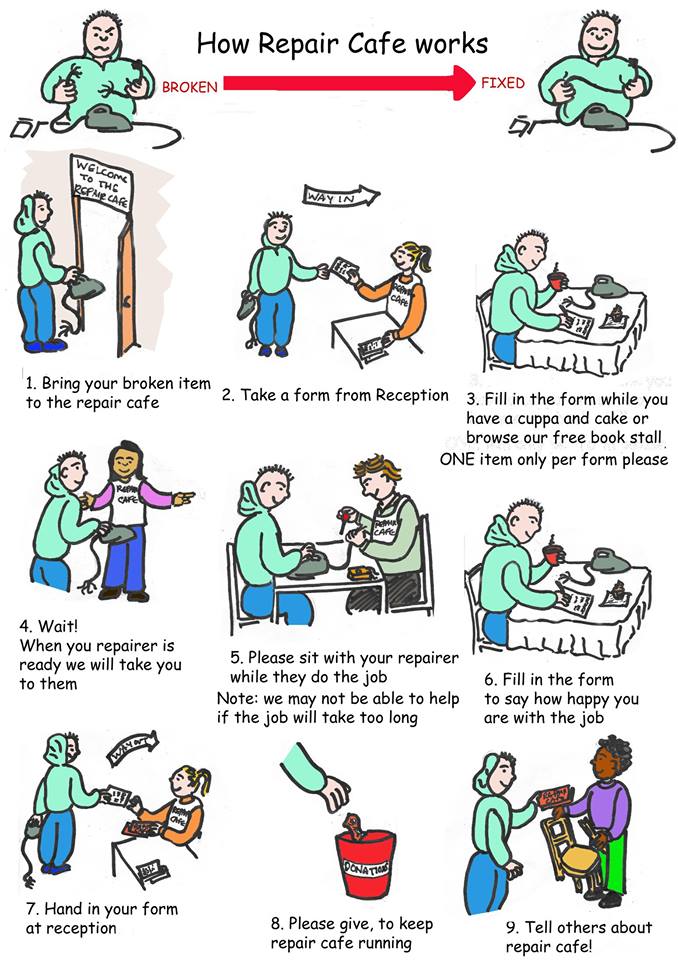We are about to launch a repair cafe (Sept) in Overton Hampshire and would really appreciate some hints and tips to get it going successfully. What is essential in the toolkit that we should provide? We currently do not have any funding, so what are the volunteers expected to bring.
Are there local grants that helped get yours going?
Everyone has their own list of indispensable tools, but you could do a lot worse than to take a look at the list in the Wiki at https://wiki.restarters.net/Tools
Great thank you! I will take a look
Hi Melanie
Great to meet you! After Fixfest UK, our big online gathering last month, we have started on listing funding possibilities for new groups. Maintaining an up-to-date list will be crucial going forward.
The classic opportunities in the UK so far have been
- Big Lottery Awards for All (although Covid has seemingly over-taken other grant-making? might be worth checking in)
- Local grocery store funds for local groups - Coop, Sainsbury, etc all have them
- The Local Trust (but only in places they are operating)
We’ll post more information once we have a more comprehensive list of opportunities that are relevant to this difficult time period.
Also, worth getting in touch with @Stuart_Ward in Reading who might have some local ideas for you. Over the years, we’ve also had positive contacts with the Hampshire Waste and Resources team, I would be happy to dive into our contacts and see if we can connect you to useful people there.
Hope you’ve seen our Kit for getting started?
Janet (and @james who will be back soon)
@Melanie_Wincott I would start by visiting a few local Repair Cafe events and see what happens. Our repairers tend to curate their own tools around their speciality. So what a computer fixer has is different to a electronic, or a jewellery fixer. Our next real event is 20 Sept in Reading. https://www.facebook.com/events/463714750921216/
Hi Janet
Thank you very much! That is very helpful and I will take a look at the Kit for getting started.
We have a local Co-op, so I will contact the branch to see if they will support us.
Best wishes
Mel
Yes joining in at an event or two and picking the brains of the organisers/volunteers is the best way to get a feel for it.
If you have to buy stuff it will be what your repairers don’t have for their specialities (and they will usually have the main things they need) - i.e. things that help you run the event e.g. flyers, a banner, … some batteries in case someone brings a battery-powered device without viable batteries (they can pay at cost if they want to keep them). Extension leads to get power to all our tables was a major startup cost because the room wasn’t at all well provided with sockets. New 13A plugs and a range of fuses, so things brought with old plugs (which you can’t leave on as they are an immediate PAT test failure) can have them replaced for the £1 cost of the plug.
We also had to do a risk assessment partly to support our validity to be covered by Mid Devon council-funded liability insurance, which I mainly copied/reused from one of the other repair cafes here in Devon, and that identified some things we needed to buy (rubber gloves to handle potentially irritant material like leaky batteries, …)
Getting someone confident/qualified/equipped to do PAT testing is critical to doing insurance-covered repairs on mains electricals. Our insurance only required an online exam as evidence, so that wasn’t too expensive, but I personally bought the PAT tester device and the cafe pays the cost of annual calibration from the donations.
Good luck!
Here’s some of the materials I mentioned that we created.
- Spreadsheet with approximate steps followed showing what’s required and generated, for both the whole event and also a generic repair. These gave me a way to get a grasp on why I needed some things, and are useful to explain to people how the event works. I should update these a bit really. Would be good to add some aspects I never thought of at the time, such as perhaps how to work with/facilitate volunteers and visitors with sensitivities to noise/crowds/interpersonal space. Also safeguarding should be considered really, but main approach to this is not to allow unaccompanied children into the event. https://docs.google.com/spreadsheets/d/1DucjsWTROLQjV1se8ybgdH2ENWdi9i5bqwGgxecASt8/edit?usp=sharing
- Risk assessment - again it identifies what’s needed for each of the risks identified. The volunteers should read+sign to indicate they understand the risks and how to manage them
Crediton Repair Cafe Risk Assessment 2018-11-10.pdf (227.1 KB) - A picture I reused from I think it was Tiverton Repair Cafe (thanks!) to have as handouts on the refreshment tables to show how the cafe works
@Melanie_Wincott Hampshire shared this grant opportunity with us. Could be of interest to you.
Please check my latest post, I think my solution fits for your goals, let me know what you think please.
I have a solution please check my last post and let me know what you think thank you.
Here is the Fixit Clinic list of tools, parts, and consumables, roughly task-organized: https://docs.google.com/document/d/10QnLXYFM0BIl-ApDTNiF8QPcQbIMl5ft_LLkB_diDCs/edit?usp=sharing
You and any others are also heartily welcome to join the ongoing Zoom Fixit Clinics and the around-the-clock around-the-world Global Fixers Discord Server:
-participant registration at http://bit.ly/fixitcheckin
-fixer/observer sign-in at: http://bit.ly/fixitcoachsignup
thank you for the information this will help 
